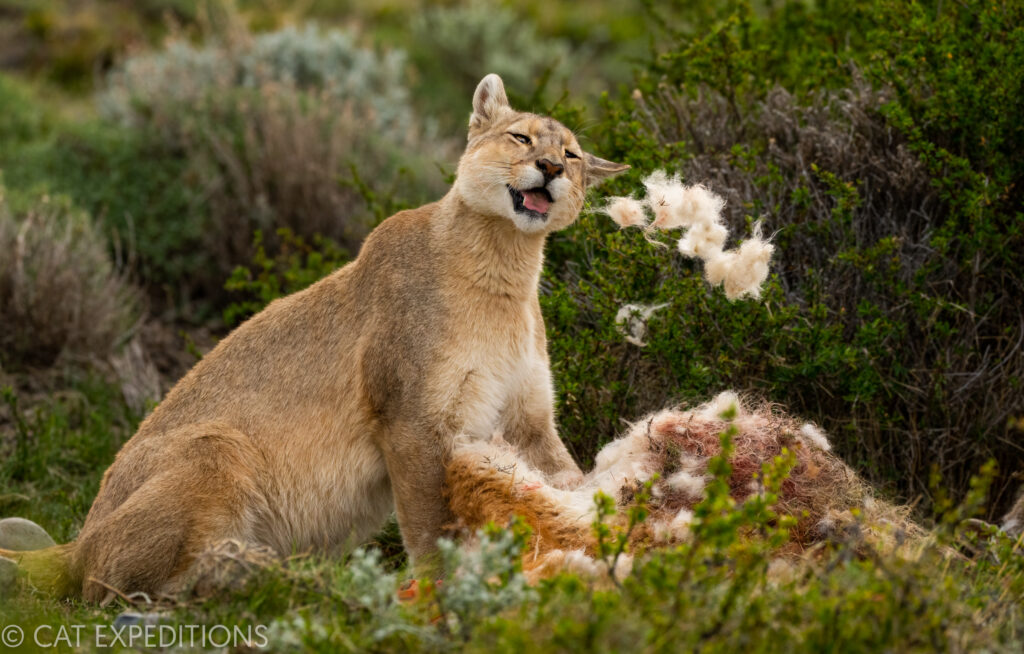In 2022, we led three pumas of Patagonia photo tours in late November, through early December. Our guest sizes spanned from one guest (private client), up to six guests to see these incredible felines. Every single trip was spectacular, filled with lots of pumas, laughs, and delicious foods. Read on for our Pumas of Patagonia Photo Tour 2022 Trip Report.
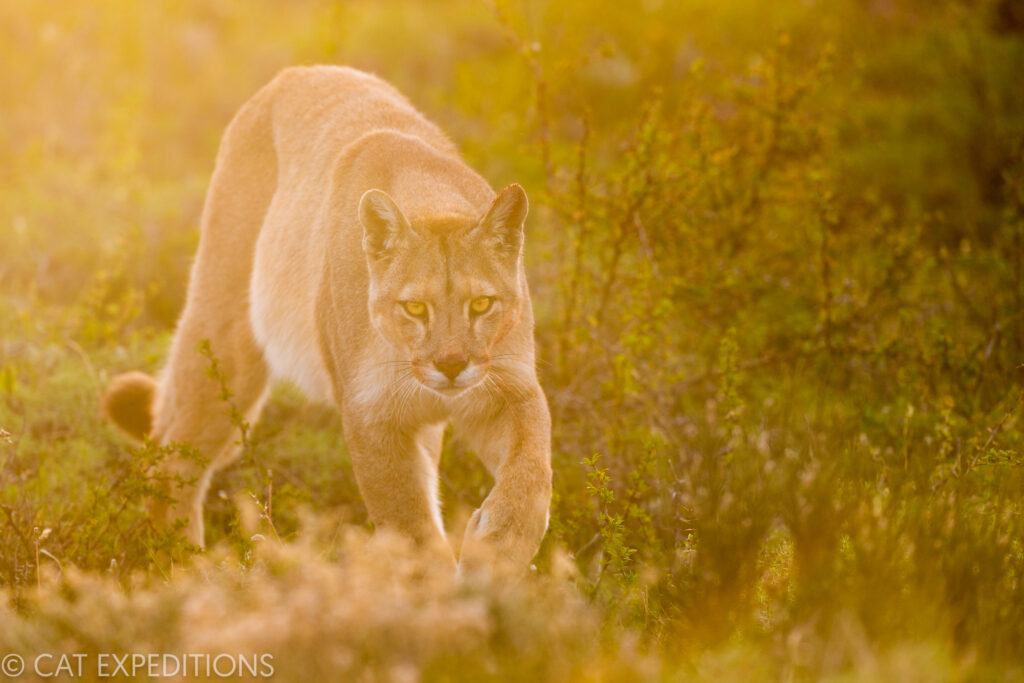
Highlights of the 2022 Puma Photo Tour
Pumas: We photographed at a minimum sixteen different puma individuals per tour, and at max, twenty-three different pumas. Sightings averaged ninety minutes per cat, at an average distance of thirty yards, but as close as just a few meters. These very close encounters were due to the cats moving and coming close to us, rather than us approaching them. Extreme caution during these encounters is taken, where we as guides ensure the safety of the clients by observing behavior, stand next to the clients when the cats are close, and asking the clients to make eye contact.
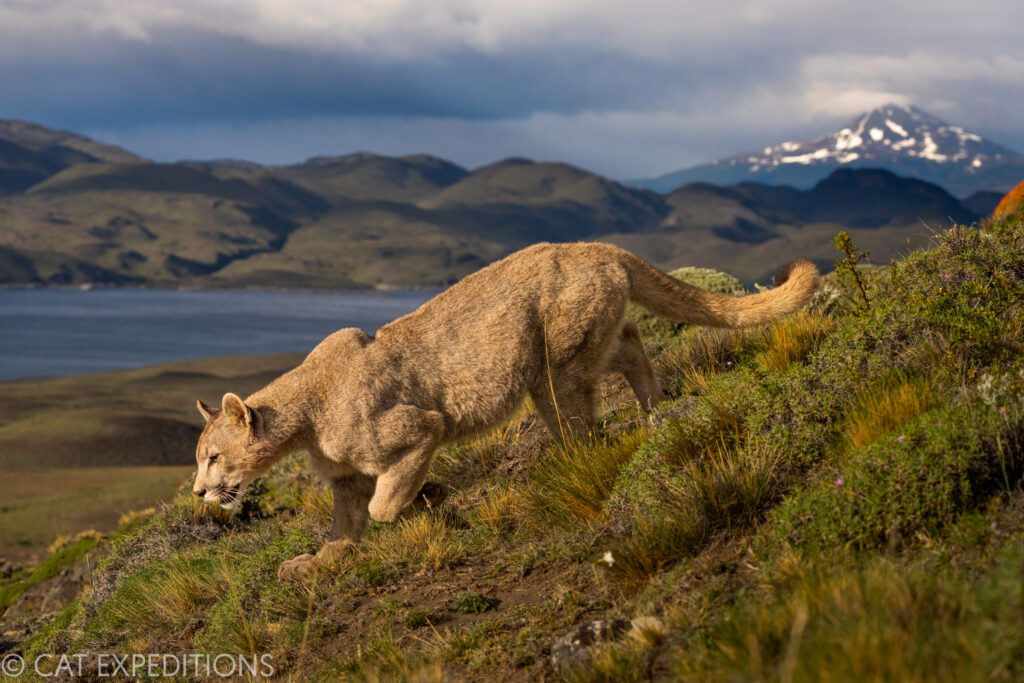
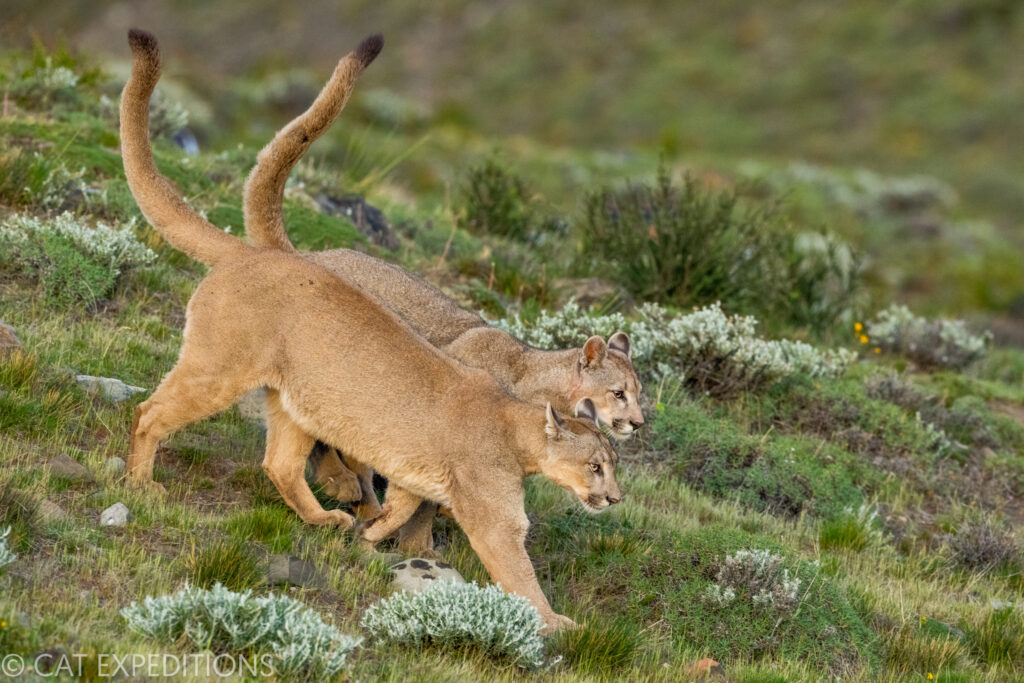
Other puma highlights included seeing the feeding on kills for each tour, including multiple cats feeding on the same kill. For all three tours, there was at least one feeding event where up to seven cats fed on the kill at the same time.
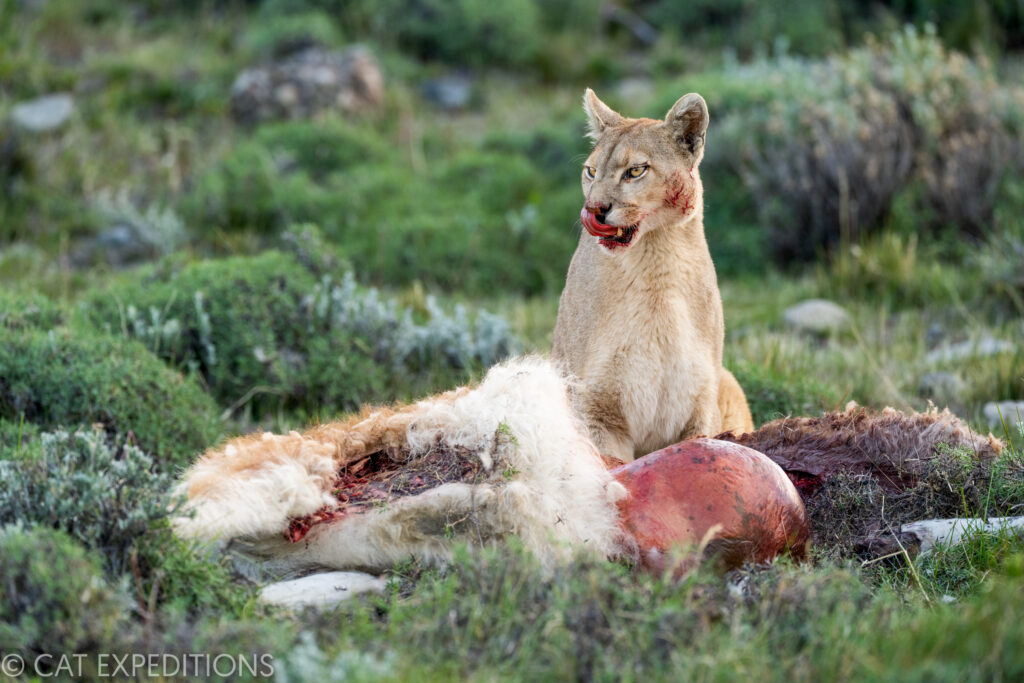
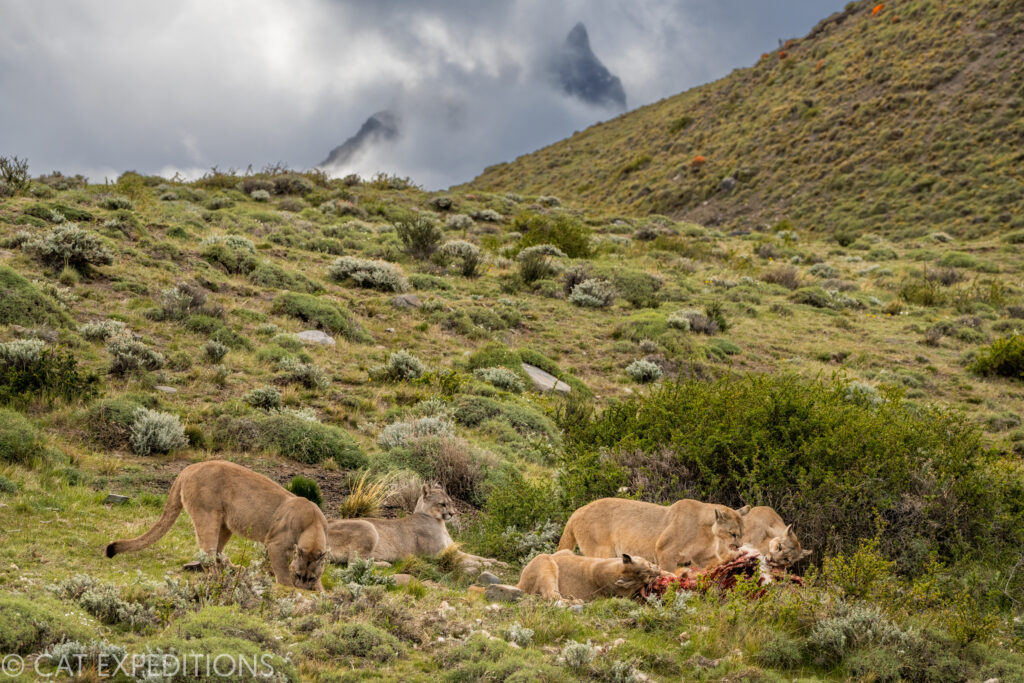
We saw multiple pumas every single full day, and for every tour we successfully saw and spent hours with puma cubs, often getting to watch them play!
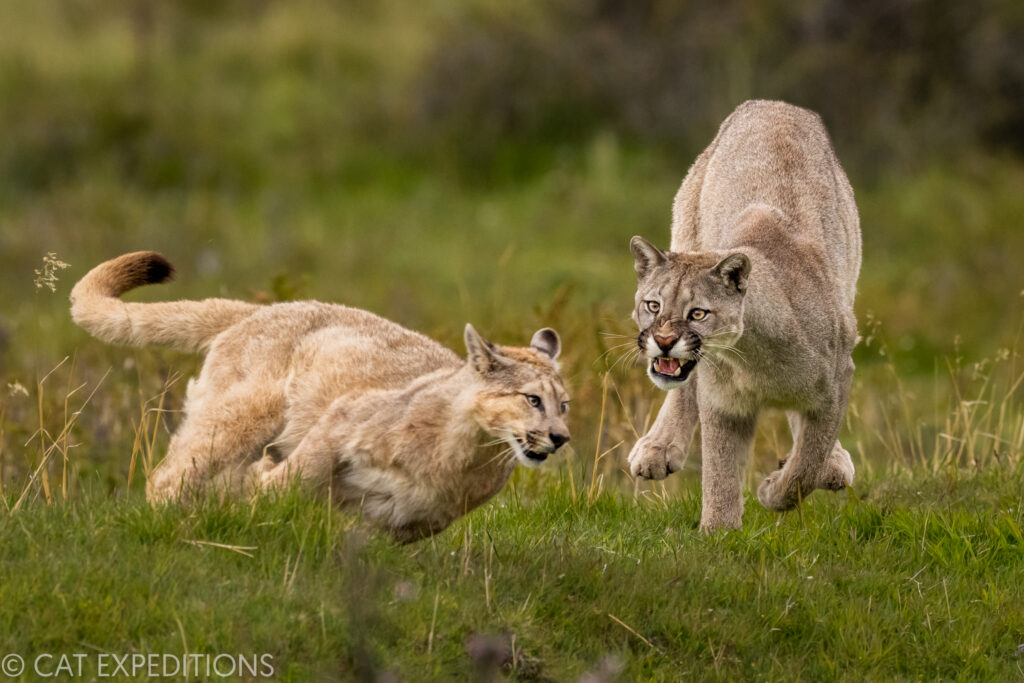
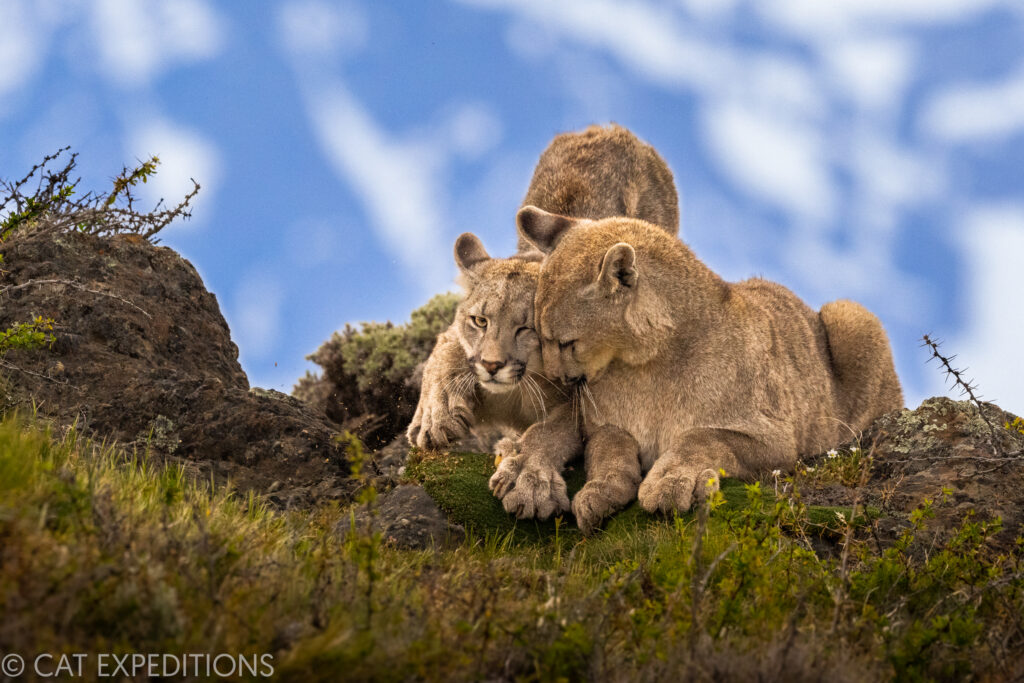
Finally, during one tour we even saw three hunts of pumas hunting guanacos, two of which were successful. Even as a trip leader, these puma trips were the best so far!
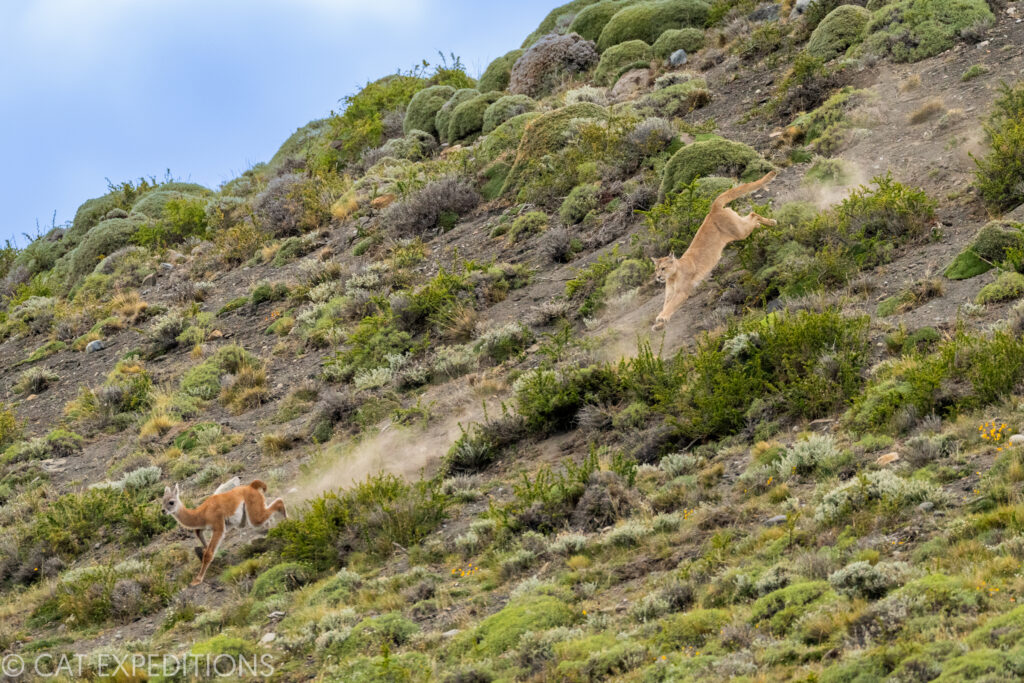
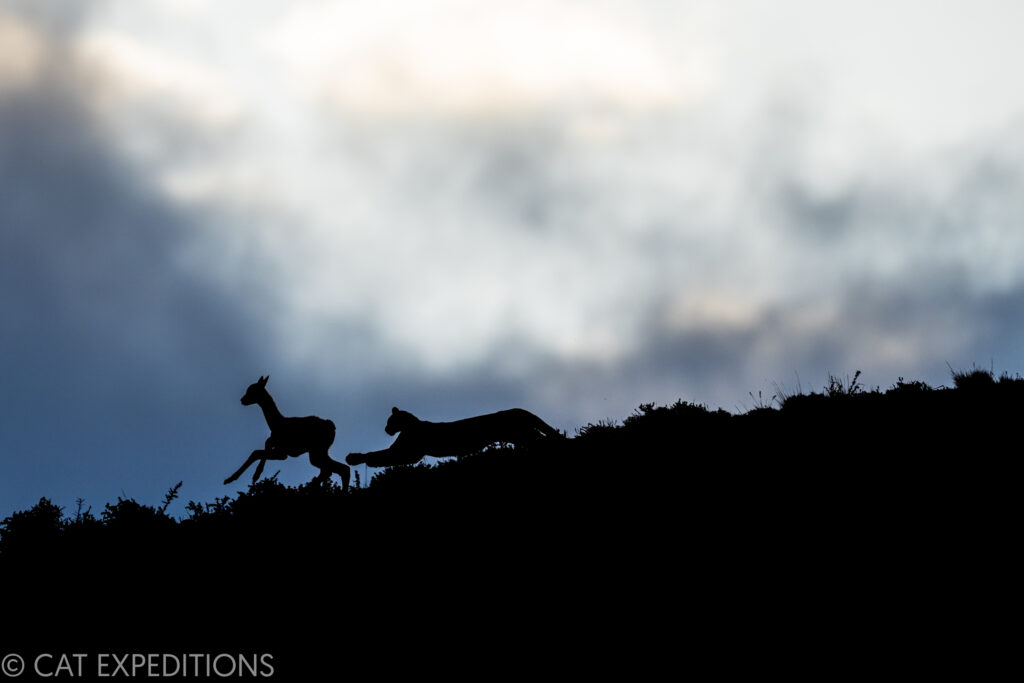
Guanaco: Though common, seeing these llama related ungulates is always a highlight, and the serve an important role, as prey for pumas.
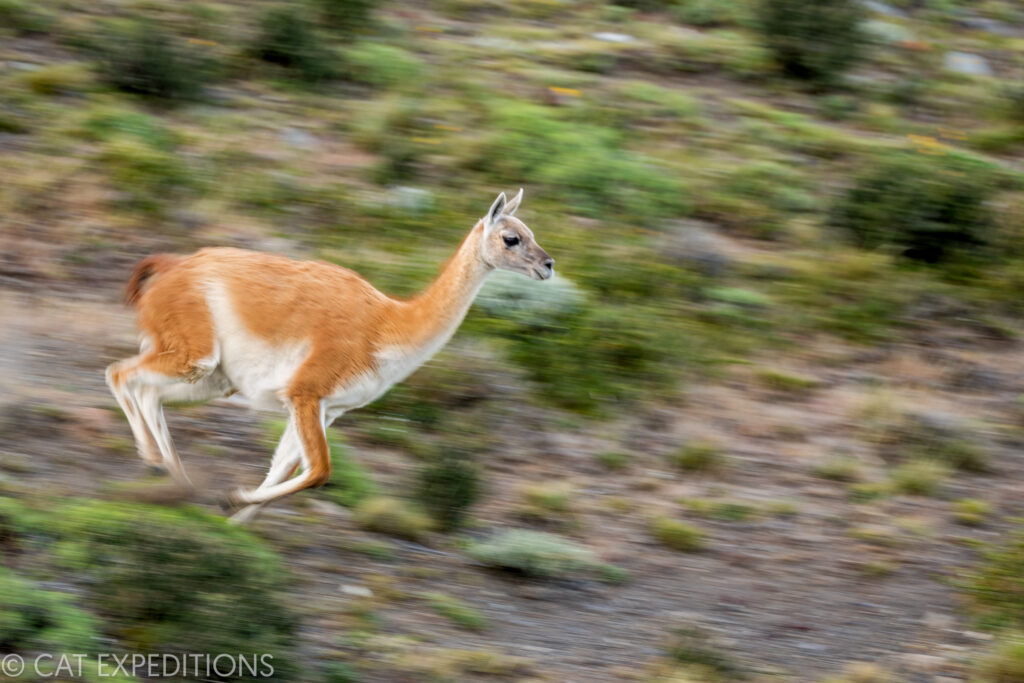
Chilean Flamingo: For every one of the three tours we spent some time photographing the small flock of Chilean flamingoes that hang out in the lakes in our puma search area.
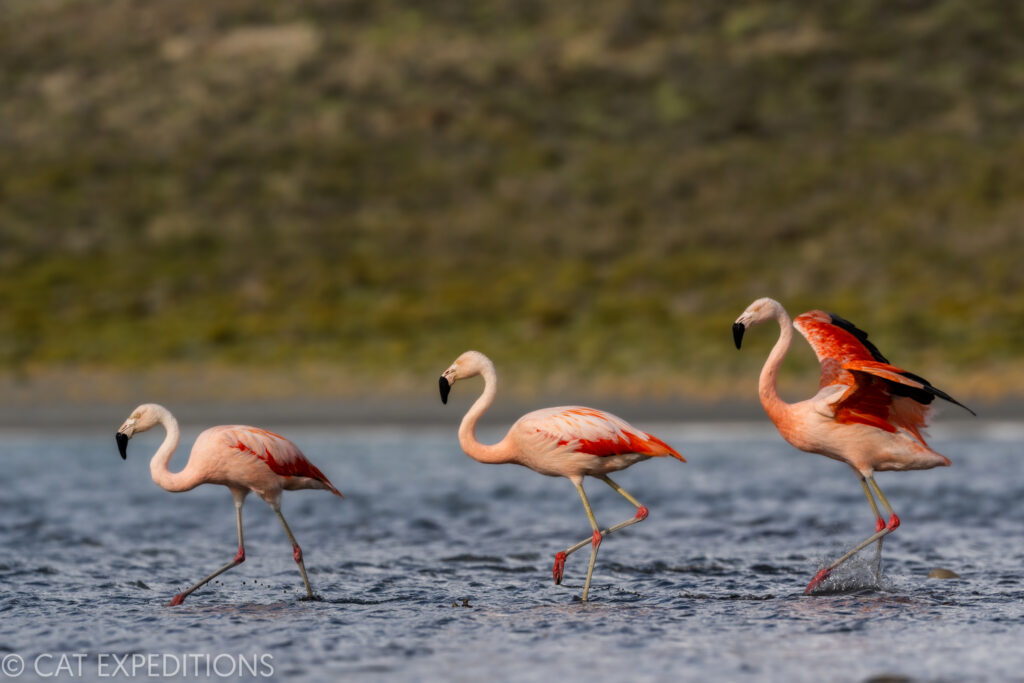
Andean Condor: To finish each tour, we visit an area where condors fly at eye-level, coming into their roost in the late afternoon. Of course, this is wind dependent. For two of the three tours, the typical Patagonian wind co-operated, and we had over forty Andean condors fly in while we were at the condor location.
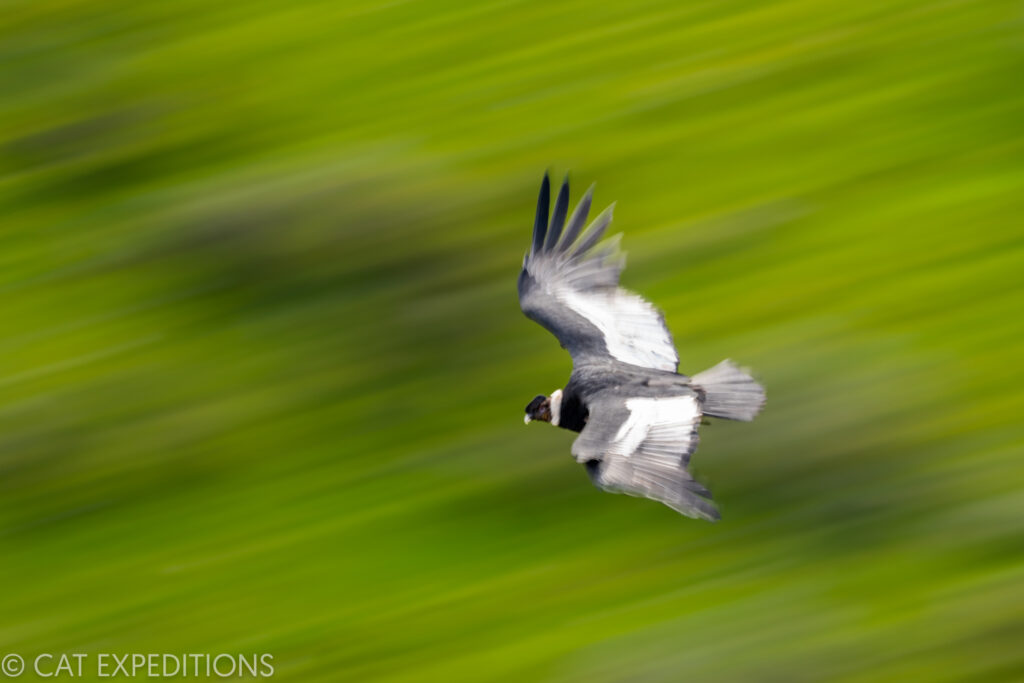
Pumas of Patagonia Photo Tour Itinerary
Day 1: Arrival in Punta Arenas. Presentation of pumas. Overnight in Punta Arenas.
Day 2: Morning departure to Hotel Tierra Patagonia. Lunch. Afternoon puma safari in Chilean Patagonia, near Torres del Paine National Park. Dinner at hotel.
Day 3-6: Puma safari at sunrise and sunset with lunch break in between
Day 7: Morning puma safari. Drive to condor location with breakfast and lunch on the way. Celebratory dinner in Punta Arenas.
Day 8: Fly out.
Detailed Trip Summary of one of our three 2022 Puma Photo Tours
Day 1: Punta Arenas, in Chile, is described as being at the end of the earth, as it is one of the most southern points on earth. Many Antarctica expeditions take off from this small, sleepy, and very windy town. Since the journey to get here is long, we settled into the hotel, had dinner, and went to bed early, to get ready for an early start the next day.
Day 2: After breakfast at the hotel, we loaded up the vehicle to start our five-hour journey to luxurious Tierra Patagonia hotel, located next to Torres del Paine National Park. After settling into our rooms, we had our delicious lunch at the hotel, which always provides multiple options for their three course meals, including vegetarian meals. Then, finally, it was time for our first safari. We used 4×4 vehicles to be able to access the rough terrain in which the pumas live more easily. We chose a spot to start scanning for the cats from. Our local guide went one way, I scanned with the group from another direction, staying in contact via radios. It was all quiet on our side, so I started walking back with the guests, towards the car. As I quickly glance across the hillside the local guide had just crested, I spot a cat sleeping under a bush. It was impossible for him to see it, based on his angle, so we got lucky. Our first cat! We watch from a distance, waiting for the cat to get up and start moving. After an hour, she starts showing signs that she will get up. We get ready to follow her, cameras in tow, but always mindful of her intentions to hunt. She crests the hills, spooks some guanacos, and then decides to lie down until after dark. Nonetheless, we were elated to have seen our first puma.
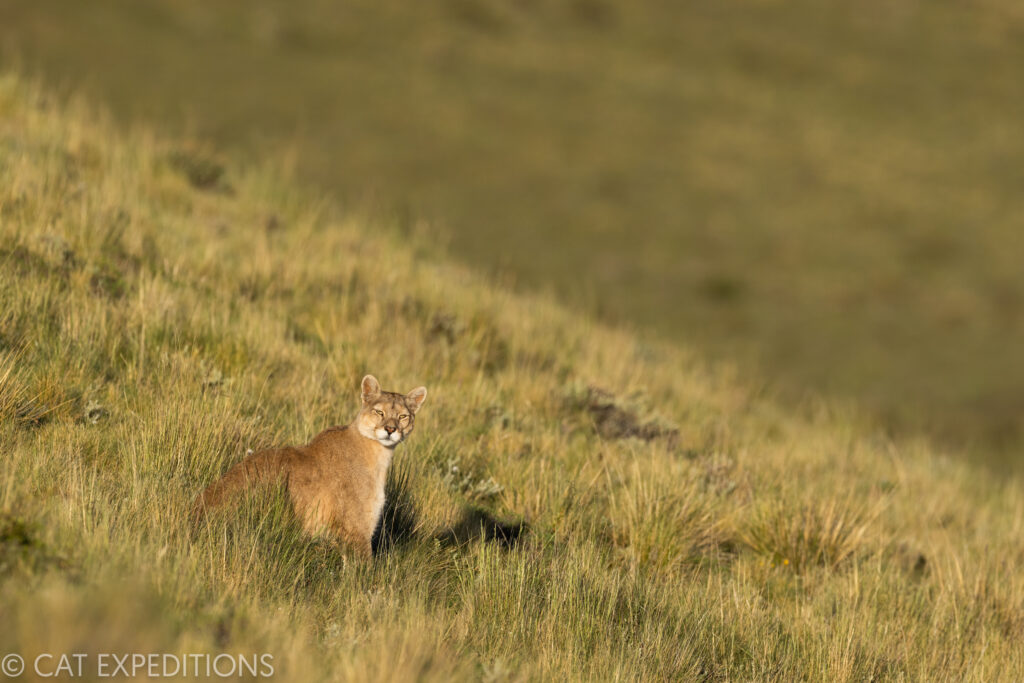
Day 3: This time of year, is Chile’s springtime, so sunrise is early. We get up around 4:15am, have a small breakfast (with another breakfast bag to go) and leave around 4:30am. Within minutes of sunrise, we find a female puma and her two cubs. The mother has a broken right leg, and her right eye (an old injury) is also wounded. She looks quite skinny, but she is determined to hunt, to feed herself and her two kittens. She crests a hill, now intend as she has seen a herd of guanaco below. In her concentration however she has totally missed the guanaco further up the mountain, which by now is alarm calling like there is no tomorrow, eliminated any chance she had at a successful hunt. In typical cat fashion, she pretends like it doesn’t bother her, and continues to walk down the hill, now not even looking at her previously envied prey.
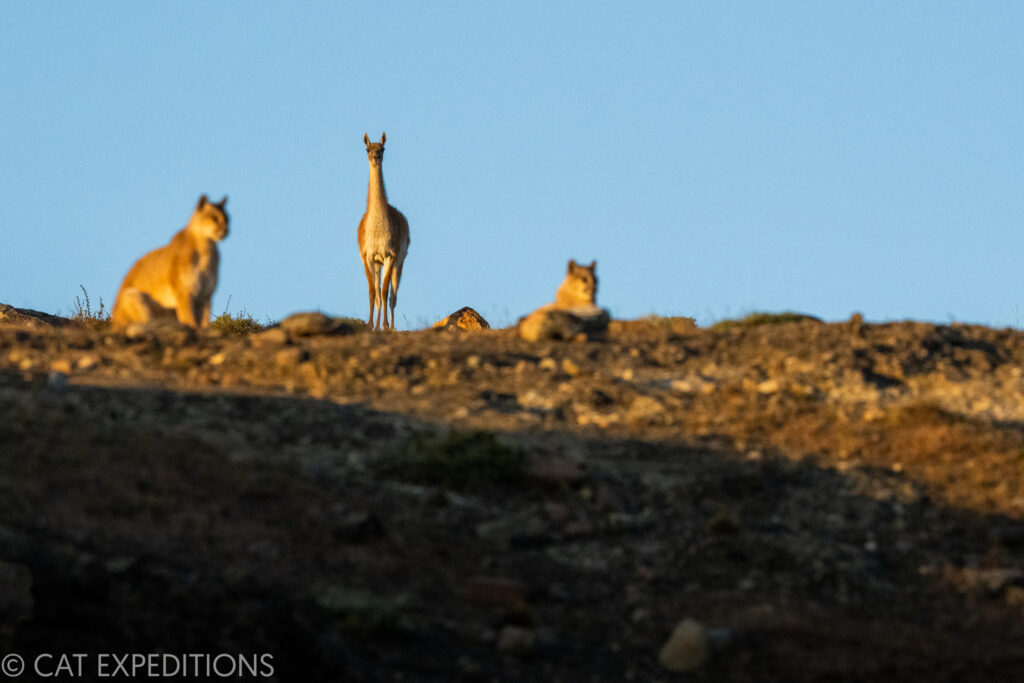
We move as a group in front, and to the side of her, expecting her to follow a dirt road. When she hits the meadow with the road, she follows the tire worn earth, as we had expected. Then, when she is about fifty yards away, she veers off, directly towards us. Her two cubs follow. I remind the group to stick together, to not make any sudden movements, and to make eye contact, if she continues to come towards us. In a fantastic show of trust by the female puma (and extreme caution by us as trip leaders and guides) she walks within a few meters of us – it is not a good idea to make sudden movements or move away quickly when the cat is so close). Her male cub follows the same path, thirty seconds behind. The female decides she wants to make a loop around us. The intimate encounter leaves us all in tears.
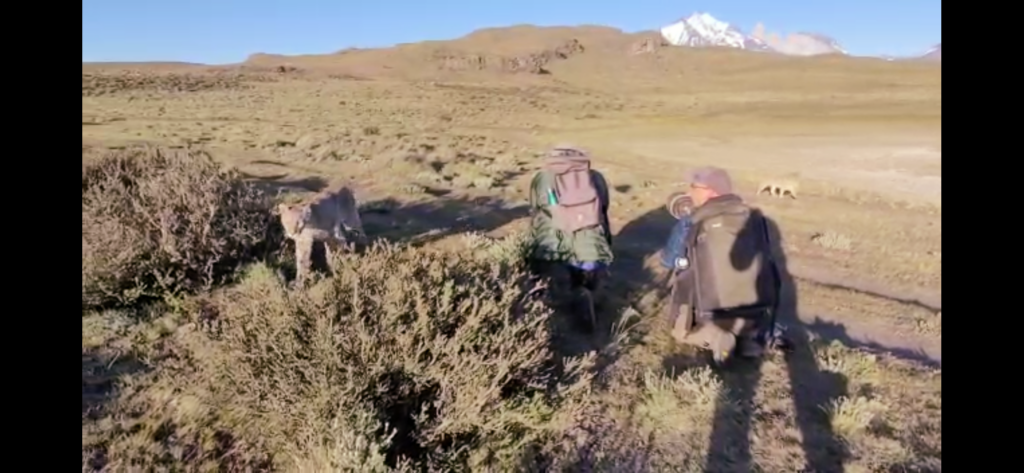
She is now heading straight to a lake, down the hill, to get a drink. We parallel her for a bit, maintaining our distance, and then let her go in peace. The total time spent with her was over three hours, it was an incredible start to our first full day in the field.
After heading back to the hotel for lunch and a bit of rest, we go out again to look for more cats. Everyone in the group has puma fever. Our local puma tracker spots another female, with two cubs, feeding on a guanaco she must have killed two days ago. We quickly make our way there and watch for three hours as the female and cubs take turns feeding on the kill.
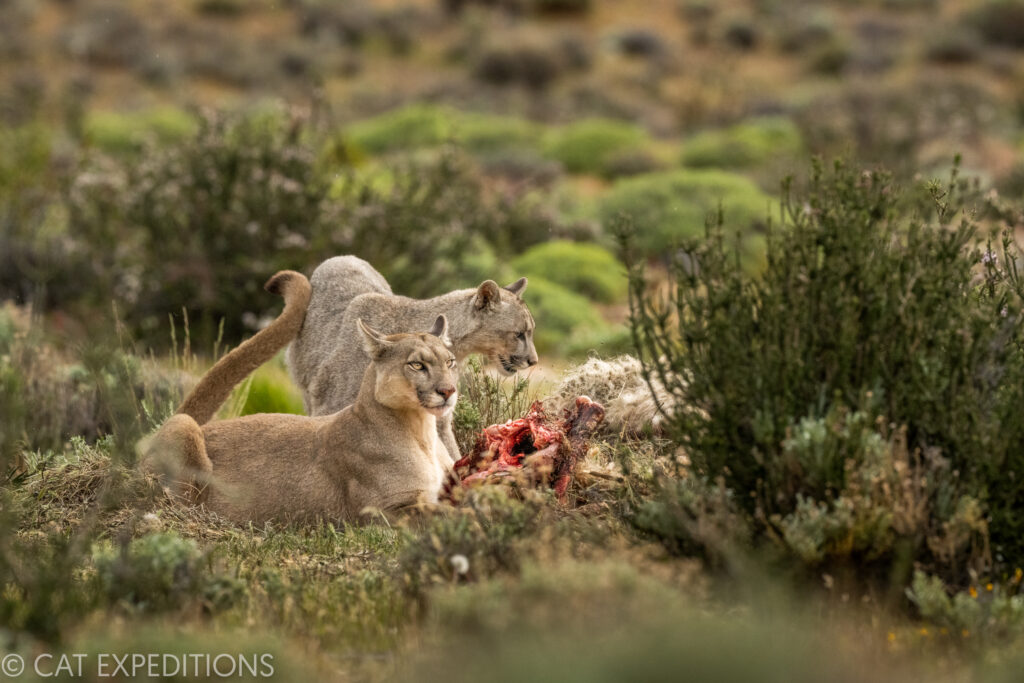
Day 4: The group spent the morning photographing Silvery Grebes (Podiceps occipitalis) that are in breeding plumage during this time of year, and court by performing displays on the water. When we aren’t with cats, we always have at least one puma tracker searching for the cats for us, who is in radio contact at all times.
A couple of hours after sunrise we get the call that the female with the broken leg was spotted by our tracker. We make our way to her and watch her drink from a very small mountain spring, with her two cubs. She looks as skinny as the last time. It appears she hasn’t eaten anything. We stay with her for a bit, before returning to the hotel for lunch, and a well-deserved rest. The people rested enough take in the beautiful views of the famous “towers”, the mountains that give Torres del Paine its name, from the hotel hot tub.
We leave at 4pm in the afternoon to once again look for the cats. At first, we take some photographs of Chilean flamingoes as they feed in one of the many lakes in the area. Their beautiful pink feathers are a stark contrast to the glacial blue waters of the lake. We once again get the call from our puma tracker that he found a cat. It’s a different female than we have seen in the past few days. She’s resting, but guanacos are close by, and she may very well go for a hunt. We make our way to her as quickly as possible, bouncing on the dirt roads across the rough terrain. When we get to her, she is still resting, but soon after a guanaco herd with a young walks by. Though she is still four hundred meters away, she starts her stalk.
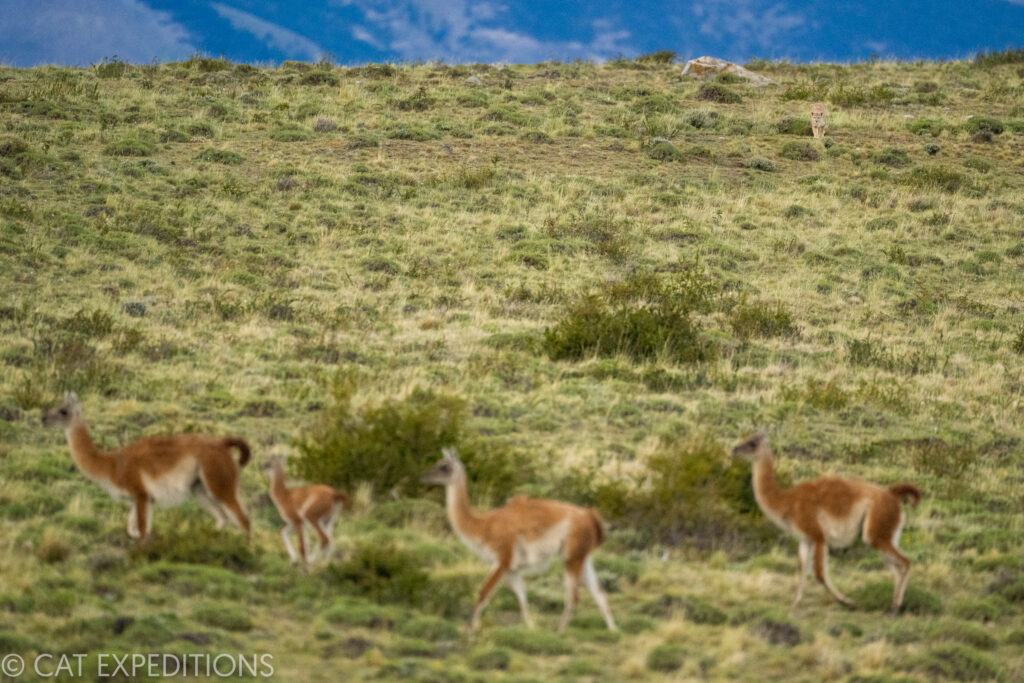
Once she has closed the distance by half, she starts to sprint, knowing full well the baby guanaco can’t outrun her. Within twenty seconds, she has reached her quarry. We did not approach during the hunt, as we don’t want to jeopardize her efforts. Once she has jumped on the guanaco baby, we approach closer. As we get to within forty meters, she is delivering the kill bite.
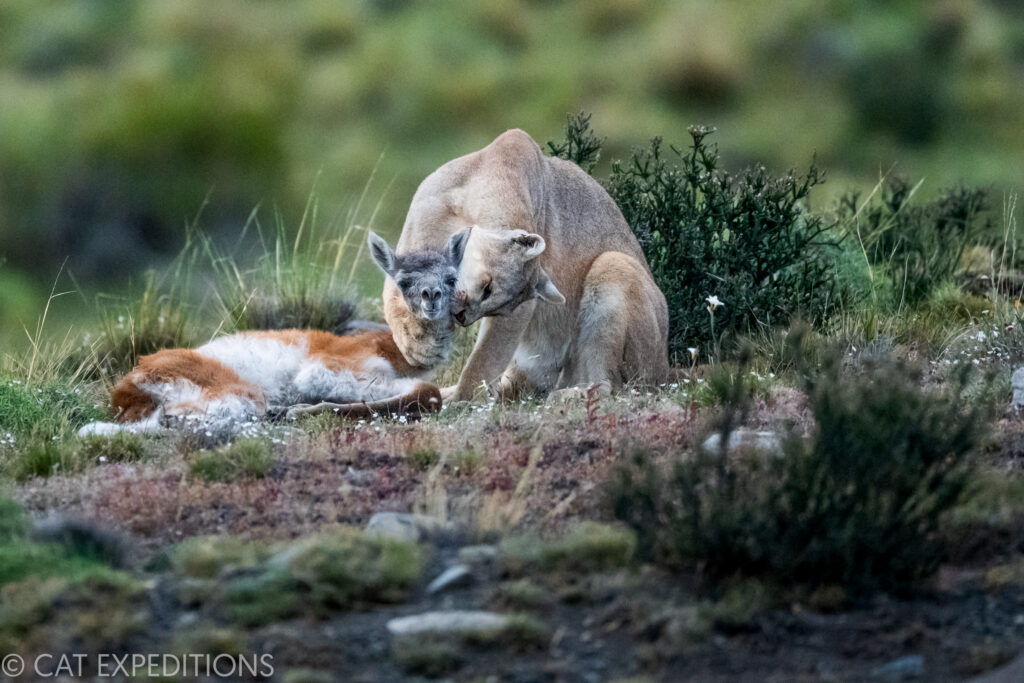
The guanaco baby is dead, and we expect the female to start feeding. Suddenly however, she looks up, sees another guanaco young, and goes into another full sprint. She chases it up the mountain, lunges at the young, misses, and then pursues the baby down the hillside.
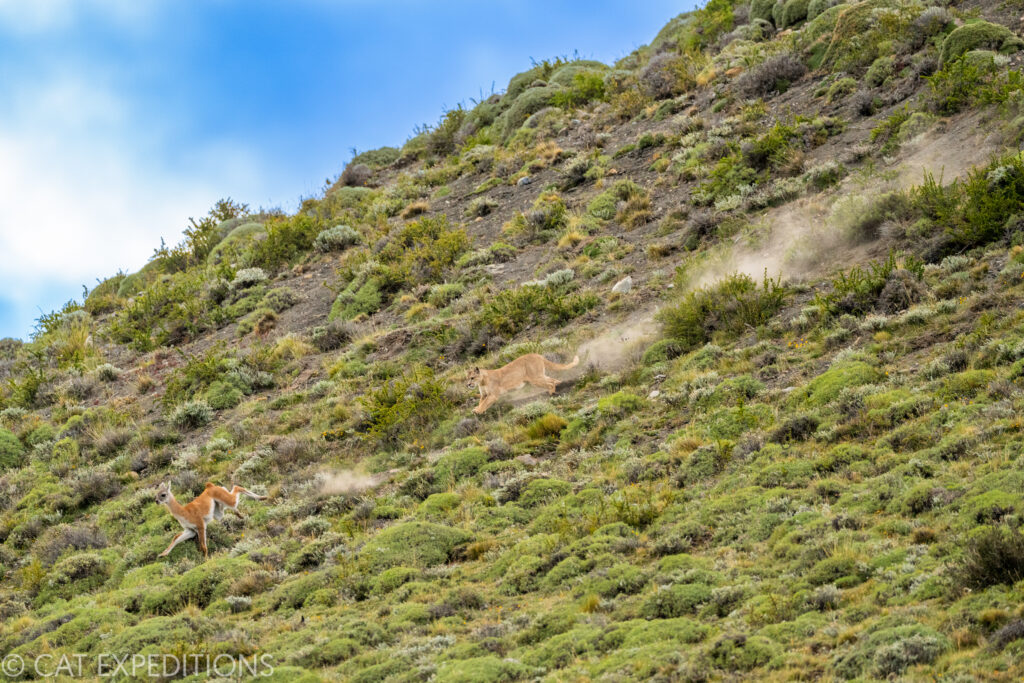
As she has almost caught up to the guanaco she disappears behind a small hill, out of view. We move as quickly as we can to see the result of the hunt. As we crest the hill, we see that she has made another successful kill. She has her paw firmly on the baby’s neck.
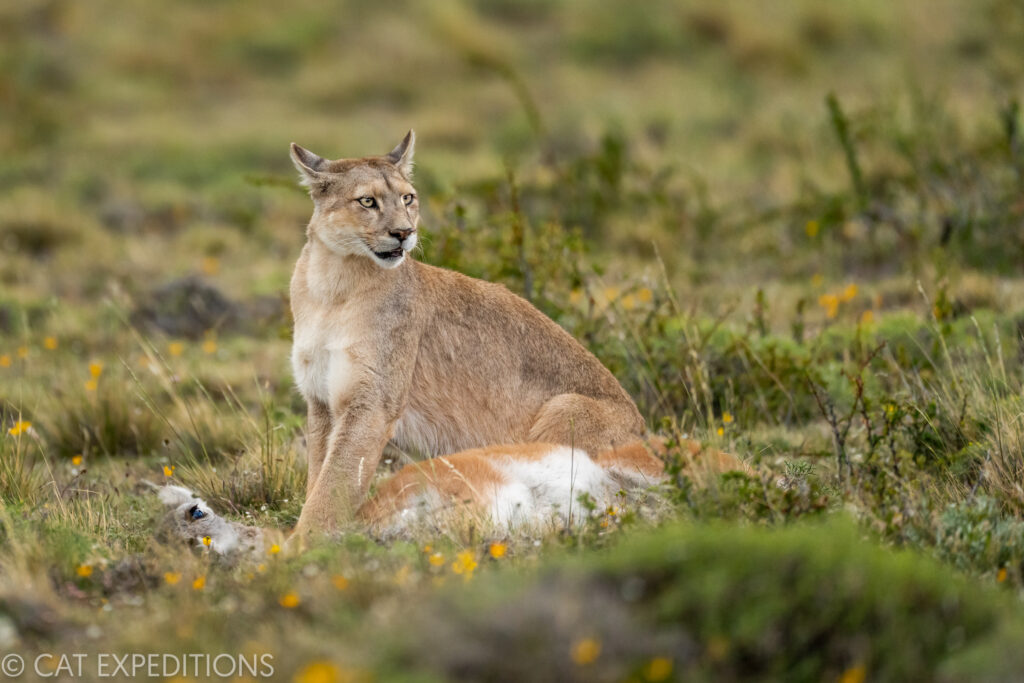
We watch as we are now unsure of what she will do next. Will she feed on this young first or return to her first kill. To our surprise, once again, we realize this guanaco baby is not dead. The female moves off of her, walks a few meters away, while continuously listening to see if the young is getting up. We realize, the puma female wants to play with her catch. The guanaco does not move. The female moves back over to it, and paws at its hindquarters, encouraging it to run away. The young obliges and the chase starts all over again. With the guanaco young already hurt, the sprint doesn’t last long. The puma has once again caught up to her. She does this two more times, before finally putting the guanaco out of its misery.
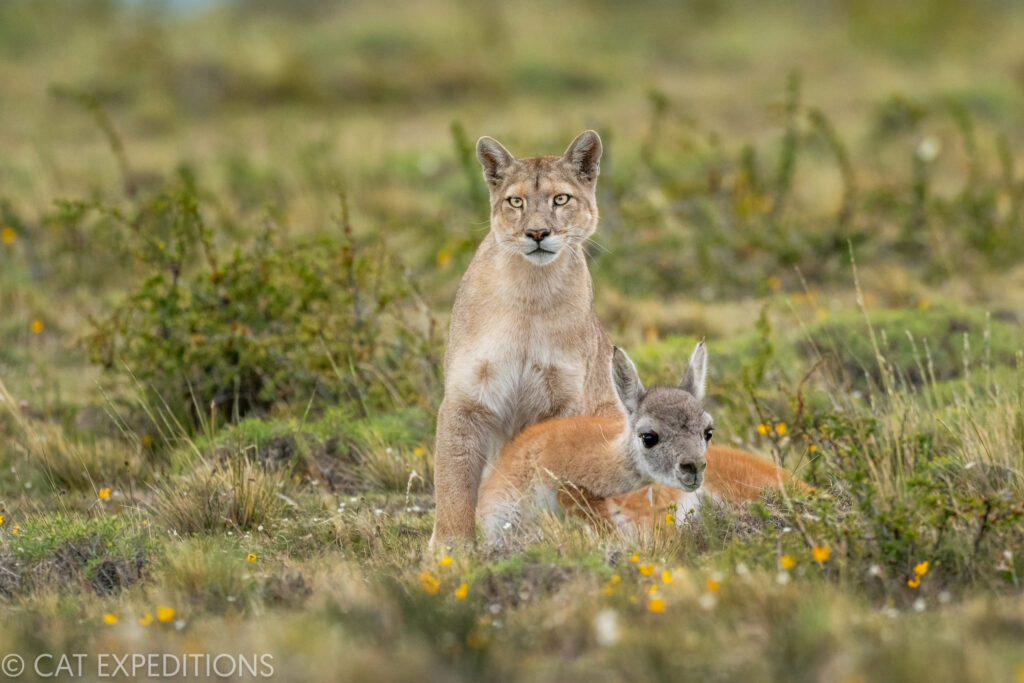
It was the most intense puma encounter for us to date. A day and experience we will never forget, filled with mixed emotions for having had the privilege to see it, and the hardships of seeing the realities of nature.
Day 5: The morning is relatively quiet. We find one female puma who is already bedded down for the day. In the afternoon, we find another, different female puma as she is resting on the crest of a hill. After an hour or so, she decides to get up and we follow her in parallel. The stunning mountains are photo worthy by themselves, so having a puma in that landscape makes the photographs just so unique and incredible. In the beginning we think the female is walking down to a lake for a drink, but as we parallel her, we see a guanaco grazing over a small berm. The puma hasn’t seen it and it appears she will walk by it completely without noticing. Then, she seems to have caught the guanaco’s scent. She immediately crouches and goes into stalk mode. We stop, again, not wanting to disturb the hunt in any way. The guanaco is still grazing and fully unaware of the cat. Within thirty seconds, the cat has come to within fifteen feet of the ungulate. Then she takes two bounds and is flying through the air, jumping on the guanacos back, who only realized the cat’s presence when the feline was already airborne. The cat lands squarely on the guanaco’s back, trying to reach the neck to make the kill.
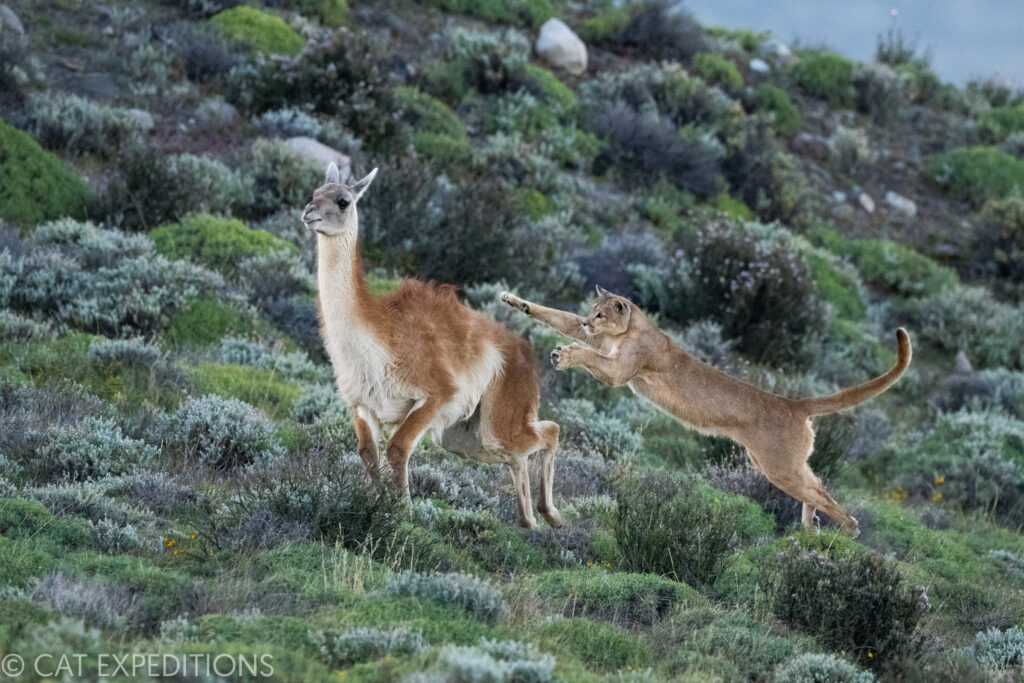
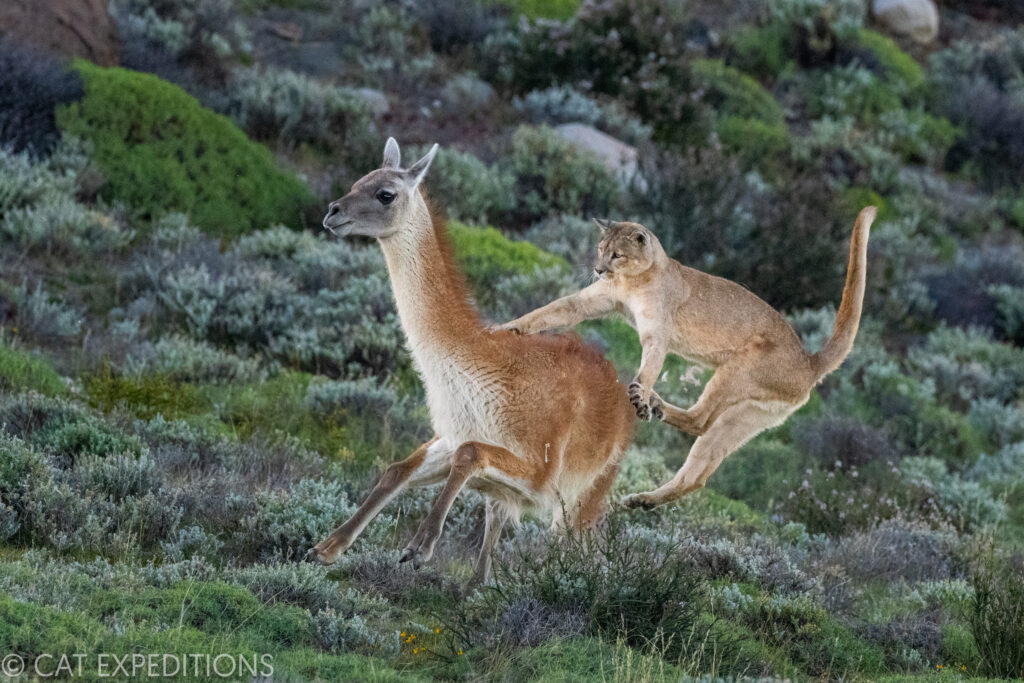
Her claws are fully extended, ready to grab the guanaco and hold on. She seems to have overshot her target however, as she starts to roll off the guanaco on the other side.
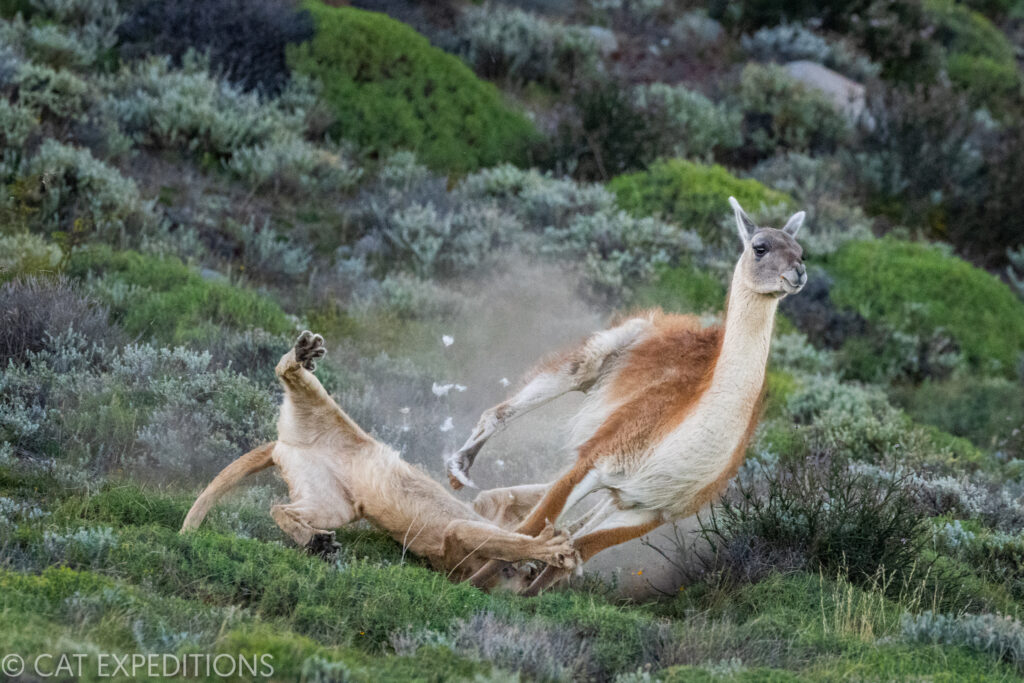
How her face wasn’t hit while she is below the guanaco is still a mystery to me. As she rolls off, she gets right back up to try and jump on the ungulate one more time, but she has missed her chance, the guanaco makes ground on her, and the puma stops in defeat.
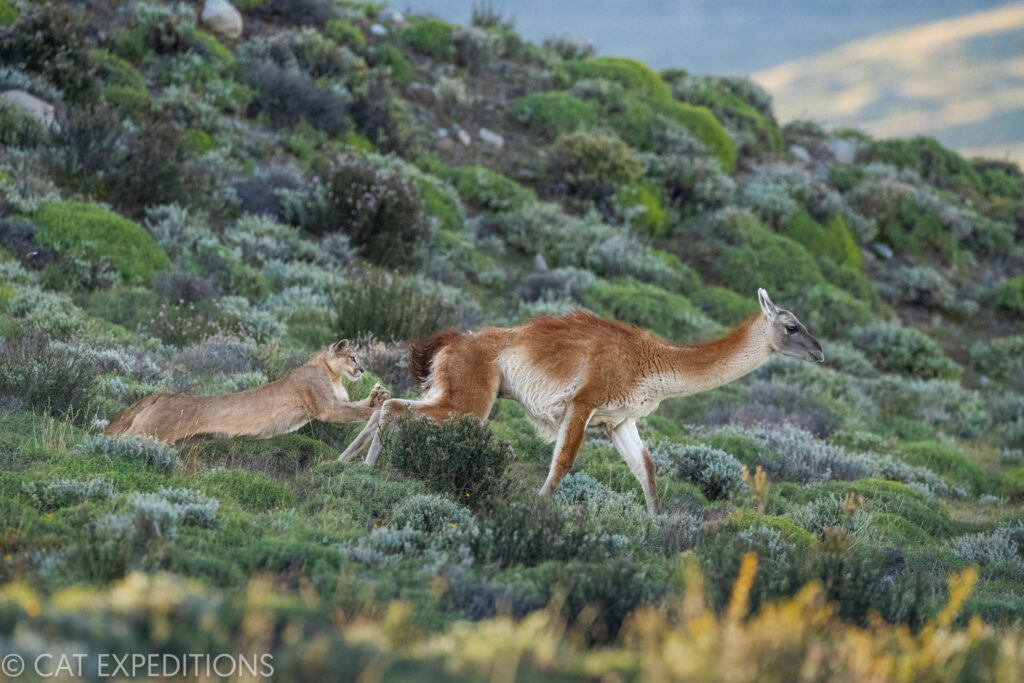
Day 6: We find a fresh puma kill in the morning, with one female on it. As we return in the afternoon, there are seven different pumas feeding on the kill at the same time. Having seen these same cats for years, we know they are not related to each other. These moments are some of my favorite as we get to see unique behavior that is so far only possible to see in southern Chile. Relationships at the kill are a mix of relaxed and tense, depending on how much food is left, and which individuals are interacting with each other. Having seen these kills quite a few times now, it seems that the cat who made the kill always gets priority to feed and cubs are often pushed off the kill, unless mom is feeding at the same time.
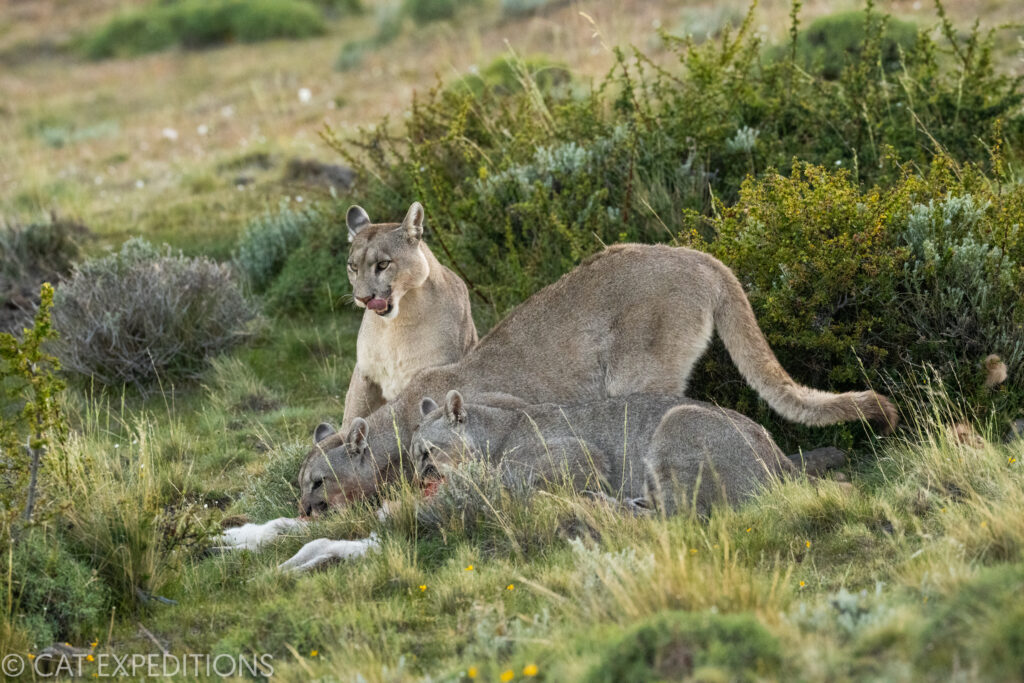
Day 7: No pumas this morning, but we photographed guanacos jumping a fence, a conservation aspect that needs to be addressed. We then had breakfast and lunch on the road and got to the condor cliff in the afternoon. The cliff is an escarpment, seemingly jutting out of nowhere and it is one of the only places for the Andean condors to roost safely in the area. It’s a five-hour drive to this spot, and yet, there are condors who roost here and fly all the way to Torres del Paine National Park to scavenge food. We were lucky, and the wind cooperated. At the end of our two hours, we saw over fifty individual condors fly in at eye level to roost on the cliff for the night.
From there it was another ninety minutes back to Punta Arenas, where we had a very celebratory dinner after which we all crashed rather hard.
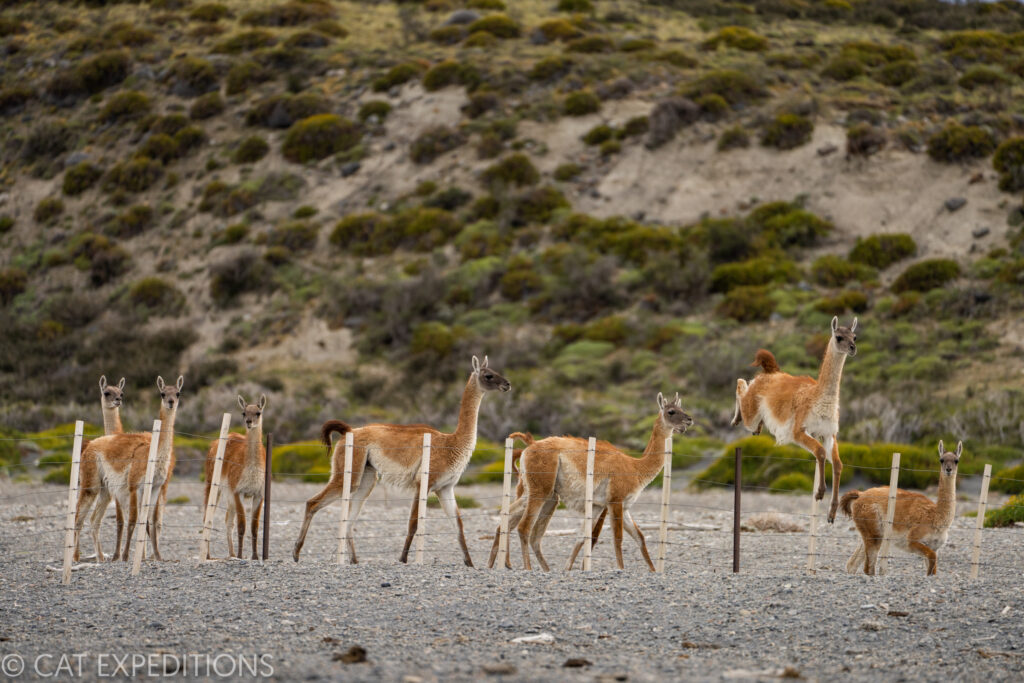
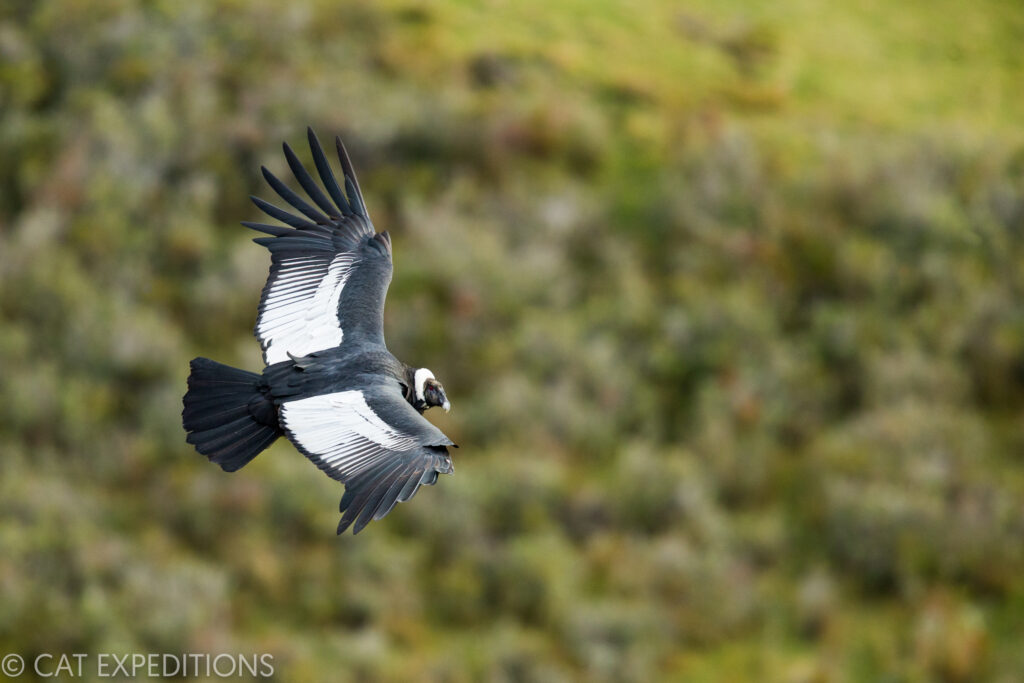
Day 8: Everyone flew out from Punta Arenas.
Combined Species List for our three Pumas of Patagonia Photo Tours in 2022
Mammals
| Puma | Puma concolor |
| South American Gray Fox | Lycalopex griseus |
| Guanaco | Lama guanicoe |
| European Hare | Lepus europaeus – Introduced |
Birds
| Lesser Rhea | Rhea pennata |
| Black-necked Swan | Cygnus melancoryphus |
| Coscoroba Swan | Coscoroba coscoroba |
| Upland Goose | Chloephaga picta |
| Fuegian Steamer Duck | Tachyeres pteneres |
| Crested Duck | Lophonetta specularioides |
| Chiloe Wigeon | Mareca sibilatrix |
| Chilean Flamingo | Phoenicopterus chilensis |
| Silvery Grebe | Podiceps occipitalis |
| Red-gartered Coot | Fulica armillata |
| Southern Lapwing | Vanellus chilensis |
| Megallanic Oystercatcher | Haematopus leucopodus |
| Dolphin Gull | Leucophaeus scoresbii |
| Kelp Gull | Larus dominicanus |
| Imperial Shag | Phalacrocorax atriceps |
| Black-faced Ibis | Theristicus melanopis |
| Andean Condor | Vultur gryphus |
| Cinerous Harrier | Circus cinereus |
| Black-chested Buzzard-Eagle | Geranoaetus melanoleucus |
| Southern Caracara | Caracara plancus |
| Chimango Caracara | Phalcoboenus chimango |
| Austral Parakeet | Enicognathus ferrugineus |
| Austral Negrito | Lessonia rufa |
| Austral Thrush | Turdus falcklandii |
| Rufous-collared Sparrow | Zonotrichia capensis |
| Long-tailed Meadowlark | Leistes loyca |
| Austral Blackbird | Curaeus curaeus |
